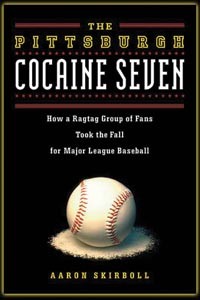The Pittsburgh Cocaine Seven
Chicago Review Press, 288 pp., $22.95
It might happen halfway through the book. Or it might not take that long. But at a certain point, careful readers of Aaron Skirboll's The Pittsburgh Cocaine Seven: How a Ragtag Group of Fans Took the Fall for Major League Baseball might find themselves shouting, "Enough!"
As in: Enough with the misspelled ballplayer names. Enough with the apocryphal stories. Enough with the unsubstantiated claims and the constant reliance on previously published material. And enough, already, with the shopworn anecdotes. (If I have to read another version of the late Dock Ellis' I-was-tripping-when-I-pitched-my-no-hitter yarn, I'm charging the mound.)
Skirboll, an area resident who grew up a Pirates fan, has penned what should've been the definitive book on the cocaine-in-baseball saga that shook the city in the early and mid-1980s. And to the extent that he's consolidated all of the story's sordid threads, he's to be thanked. But unfortunately, this is a sloppy book, one that gets little details wrong and contains so many dubious "facts" that the entire project is called into question.
The book tracks the downfall of the seven small-time drug dealers who landed in prison, even as the players they supplied were granted immunity from prosecution and allowed to resume their lucrative careers. Stars like Dave Parker and Keith Hernandez were named as users. This was The Baseball Drug Scandal -- at least until steroid-fueled behemoths turned the record books upside down a generation later.
Though others have made the same point, Skirboll is correct when he argues that "[t]he steroid era should never have been allowed to take place": The game's guardians shouldn't have waited another two decades to test for drugs. And it seems unfair that guys who were mostly two-bit dealers were locked up while their wealthy customers went free.
Because several of the dealers were locally based -- one implicated figure, who escaped prison by wearing a wire, was employed as the Pirate Parrot mascot -- "the attack on the city was ... fierce," Skirboll writes. In support of his assertion, however, he offers but a lone paragraph in which he quotes then-Pirates owner Dan Galbreath defending the city. Pittsburgh may indeed have felt unfairly criticized, but Skirboll should've provided more evidence than Galbreath's single, rather innocuous comment.
Skirboll's inability to flesh out this argument seems related to his reliance on secondary sources. To a degree, this must've been unavoidable, as some of the key figures are no longer with us (Galbreath, for one, died in 1995) and others clearly didn't want to talk; just two ex-players are thanked in the book's acknowledgements. Yet that doesn't excuse the book for reading like a greatest-hits collection of sports journalism from 1985.
And for arguably the most important part of the book -- the final thought -- Skirboll lets another author do the heavy lifting, quoting from Eight Men Out, Eliot Asinof's 1963 book about the 1919 Chicago "Black Sox" mess. Skirboll has lived with this material for several years -- surely he could've offered his own summation.
Then there are the stories -- peripheral though they may be -- that don't pass the BS test. For example, Skirboll repeats the tale of Parker "literally knock[ing] the cover off the ball with a strapping base hit." It's the baseball equivalent of an urban legend.
Finally, the misspellings. Dan Driessen, the ex-Reds infielder, makes a single appearance in the book (in a passage that has nothing to do with drugs) and Skirboll calls him "Dreissan." Lee Mazzilli, a former Met and Pirate, appears three times, according to the book's index -- and only once does the author manage to spell his last name correctly. If Skirboll can't read the names on the backs of the players' jerseys, should we trust him to guide us through the maze of an FBI investigation and a series of criminal cases?
Aaron Skirboll and The Pittsburgh Cocaine Seven Launch party: 7-9 p.m. Thu., Sept. 2 (Firehouse Lounge, 2216 Penn Ave., Strip District; 412-434-1230). Reading and signing: 2 p.m. Sat., Sept. 11 (Joseph-Beth Booksellers, South Side; 412-381-3600). Reading and signing: 4 p.m. Sat., Sept. 18 (Borders, East Liberty; 412-441-1080).















